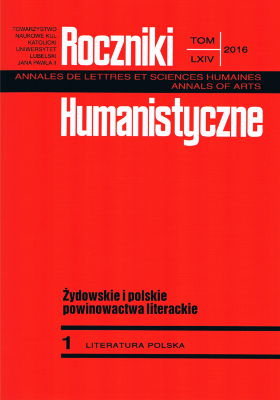Jana Kochanowskiego epigramaty o „pszczołach budziwiskich” i radziwiłłowska elegia (III 9). Prolegomena do badań nad środowiskiem kulturalnym Mikołaja Radziwiłła Czarnego
Jan Kochanowski’s Epigrams on the “Budziwiszki Bees” And Radziwill’s Elegy (III 9). Prolegomena to the Study of Cultural Environment of Nikolai Radziwill the Black
Author(s): Dariusz ChemperekSubject(s): Language and Literature Studies, Studies of Literature, Polish Literature
Published by: Towarzystwo Naukowe KUL & Katolicki Uniwersytet Lubelski Jana Pawła II
Keywords: Jan Kochanowski; Nikolai Radziwill the Black; reformation; patronage; epigram; foricoenium; elegy
Summary/Abstract: Four Polish language epigrams on the “Budziwiszki bees” (Epigrams, Second Books, 83-86), two Latin miniatures from the volume Foricoenia (44, 45) and Elegy IX of Book III Elegiarum libri quattuor by Jan Kochanowski document his relationship with Nikolai Radziwill the Black (1515-1565), the great Lithuanian chancellor and voivode of Vilnius, the leader of the Protestants in the Polish-Lithuanian State. The poetic miniatures were probably written between June 10 and October 19, 1563 in Budziwiszki aka Bujwidiszki (now Buivydiškės) near Vilnius, and Kochanowski wrote Elegy IX in autumn 1563.While in Elegy IX the poet creates the image of Radziwill as a statesman, a servant of the state of King Zygmunt August, in the unpretentious epigrams the magnate is presented as a patron surrounded by the humanists who promote reformation. Kochanowski described lexicographer John Mączyński, poet Andrew Trzecieski junior and most probably Cyprian Bazylik, poet, musician, and printer, as the Radziwill “bees” – hard-working, charitable, bringing the truth to the God's earth (a reference to a Platonic topos). In his epigrams, the author showed Nikolai Radziwill the Black as a patron of culture of the new format promoting Protestantism, and the creators gathered around him as a coherent literary milieu. Although it was presented in an affirmative way, Kochanowski maintained an attitude of the benevolent outsider. It is reflected by the skeptical tone of foricoenium 45 and biographical circumstances of the poet who was the then secretary of Bishop Piotr Myszkowski.
Journal: Roczniki Humanistyczne
- Issue Year: 64/2016
- Issue No: 1
- Page Range: 153-172
- Page Count: 20
- Language: Polish

